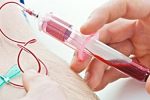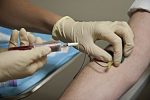Phlebotomy is one of the fastest-growing careers in healthcare. It is an entry-level position that often requires less than a year of training. Of course, there are degree courses in phlebotomy that can give you a leg up on the competition. Some requirements are the same throughout the country, but it’s important to know state requirements as well. In Alabama, some of the best phlebotomy classes are in bigger cities like Birmingham.
Phlebotomy has become a popular job because more people need their blood drawn than ever before. This is due to an aging population and more tests that can be performed with a blood draw. It takes an organized and personable individual to be a phlebotomist in Alabama.
Requirements on a state-by-state basis are slightly different. Alabama is one of the states that doesn’t currently need certification. That means you can complete your training in months.
Going to the right training facility is important. Because phlebotomists are in such high demand, you’ll want to make sure your training program is at a respectable location. You’ll also want to be sure you have all the requirements necessary to get hired right away.
[su_list icon=”icon: check-circle”]
What to Expect When Training for Phlebotomy in Alabama
This guide will cover some of the best phlebotomy classes in the heart of Dixie. Not all phlebotomy training programs are created equally. The field is competitive right now. You’ll want to choose the best class possible, depending on your location.
We’ll also go over what you can expect as a phlebotomist in Alabama, and what will be required of you. This includes training requirements, and what will be expected on a daily basis after you’ve been hired.
Phlebotomists can find work everywhere from busy hospitals to small clinics. The work you do will be similar no matter where you work, so you should be prepared to handle almost any type of environment.
Phlebotomy Certification Requirements for Alabama
Alabama is one of the states where this type of certification isn’t necessary. You can become a qualified phlebotomist and get hired almost anywhere with less than a year of training.
But, just because it isn’t required doesn’t mean you shouldn’t continue your training and get certified. More and more states are requiring it. There is no guarantee that Alabama won’t eventually need it. Getting your certification now will put you in a better position, and you’ll be one step ahead if it ever does become a necessity.
Some employers may prefer phlebotomists with certification. It could make a big difference in how quickly you get hired, and whether you get chosen over another potential employee. For now, it’s your choice whether you want to get certified or not. But, if it’s something you’re interested in, make sure wherever you train offers it as an option.
What Can I Expect from a Training Program?
The main goal of a phlebotomy training program in the state is to teach students the skill of blood drawing. This is called venipuncture. There are different venipuncture techniques that will be taught throughout the class.
Most phlebotomy classes in Alabama will have two parts. The first part will be in a classroom setting. This is where students will learn the art of drawing blood. They will also cover medical terms, as well as lab and general safety rules. It’s important for a phlebotomist to be incredibly organized, so the classroom is a great place to hone those skills.
In the classroom, you’ll also likely learn things like CPR. Certification in CPR may be required to complete some classes.
The second part of the training will be a more hands-on experience. Completing a training program in Alabama will cause you to perform a certain amount of successful blood draws. These are either done on fellow students or on a volunteer basis.
Some classes will finish up with an externship. These are great opportunities for students who will be looking for work immediately after they complete training. Because phlebotomists are in such high demand, completing an externship at a hospital can make it easier to get a job there.
Even with certification, an accredited phlebotomy training program will take less than a year. If you want a career in healthcare but don’t want to spend years going to school, becoming a phlebotomist is a great option that can lead to a lifelong successful career.
If you’re looking for the best place to take phlebotomy classes in Alabama, look no further. Keep reading to learn a bit more about some of the best schools and training programs in the state.
Why Does Phlebotomy Certification Matter?
Even though Alabama doesn’t need certification, it matters. Yes, it looks better on a resume and will probably put you ahead of the competition. But, that’s not the only reason getting your certification in phlebotomy is important.
Certification is important because it tells potential employers that you’re dedicated to your position. It also states that you’ve met all the requirements necessary to be a highly qualified phlebotomist. That’s not only a great way to get hired, but it’s one of the best ways to advance your career as a phlebotomist, or in medicine in general.
There are different certification organizations to consider. It’s important to choose the right one for your state.
Some questions you can keep in mind include:
- Which organizations are approved in the state of Alabama? Whichever class you attend, make sure you get a current list of organizations that are approved by this state. Even if you’ve already been certified in another state, you may need to take the test again per Alabama’s standards, if you want certification.
- Do certain employers in your city or nearby (Mobile, Birmingham, Huntsville, etc.) prefer a certain school or organization for certification? Certification may not be required in Alabama, but many employers and hospitals prefer it. If there is a more reputable organization, you should seek it out to increase your chances of a better job.
- Is the organization you’re looking at to get certified reputable on its own? What do online reviews say about it?
What Questions to Expect
When you’re ready to take a certification test, you can expect it to be a general coverage of the things you learned throughout your training course. Along with questions about blood draws and patients, one of the biggest concerns a certification test has is to make sure you know safety procedures. Safety precautions are one of the most important aspects of this job. So, you can expect questions dealing with:
- Workplace hazards and how to deal with them
- Prevention of nerve damage and accidental sticks in patients
- Properly sterilized equipment
Even if you just completed a training course, it’s a good idea to do as much studying as possible before your certification exam. Most certification organizations provide their own materials to study. By taking their notes into consideration, you’ll have a better chance of correctly answering the questions they create.
What Are the Best Places to Study Phlebotomy in Alabama?
It’s important to go over as much safety material as you can because a majority of the questions will cover those procedures. That’s why certification puts you ahead of the job market game. Employers will know, once you’re certified, that you’re not a liability for them.
Jefferson State Community College
Jefferson State Community College is located in Birmingham, Alabama. It includes 200 hours of both classroom work and hands-on work to complete the phlebotomy training program. This 200 hours will include phlebotomy certification. You don’t have to worry about more classwork after you complete the basic training program.
Jefferson State also offers a ‘Fast Track’ option to get a phlebotomy certificate. With this program, students will complete a 144-hour training program to become a certified phlebotomist. It’s a non-credit program for the college itself. So, if you’re enrolled in the college and are working toward a specific major, this program won’t offer credit toward that major. But, if you strictly want to become a phlebotomist and want certification, this is a quick way to do it from a qualified school.
Classes meet for the lecture part just twice a week. Once training is complete, you’ll have the opportunity to take an online test. Then, you can take the certification test with the National Phlebotomy Association.
Not only can this program be completed in a short amount of time, but it’s also fairly inexpensive. You can complete your training for about $1000, plus fees.

Calhoun Community College
Calhoun Community College has two different campuses. One is located in Decatur, AL, and the other is located in Huntsville. The Huntsville campus offers a phlebotomy technician program. There are limited spots available in each program because they want to focus on small groups of students at a time. Because of this, you know you’ll be getting the needed attention to become a great phlebotomist.
To be a part of the phlebotomy tech program at Calhoun College, you must be enrolled in the school. This is an eight-week program. It is held only one day a week, but the school offers both afternoon and evening classes to make it easier for people with busy schedules or jobs.
You must attend an enrollment program to be considered for this class. The program will include:
- Ordering scrubs
- Signing necessary paperwork
- Bringing necessary documentation (high school diploma or equal)
At the enrollment program, you’ll also discuss an optional addition to the training program at Calhoun. They offer a two-week clinical rotation option. If you choose this option, you’ll have the opportunity to work in a local hospital or clinic for up to 50 hours. During that time, you’ll be required to complete at least 100 blood draws.
You must complete the two-week clinical rotation in to be eligible to take the National Phlebotomy Certification Exam. The extra fees for the rotation program will also include the cost of the exam. If you choose to not take the clinical rotation program, the class itself only costs $750. This includes your textbooks and lab fees.
Jeremiah’s Hope Academy
Jeremiah’s Hope Academy in Birmingham is a part of St. Vincent General Hospital. This provides a few extra benefits when you choose to take a phlebotomy course. First, you know you’re getting top of the line training from a prestigious hospital in the state. Second, it can be easier to find a job if you train with that particular hospital. They may be more likely to hire you knowing you’ve gone through their specific program.
The phlebotomy training program at Jeremiah’s Hope is made up of 246 classroom hours that spans over 12 weeks. During that time, students will also gain lab experience and have to perform successful blood draws.
This training program will also cover things specific to the hospital, such as their policies on patient care. You will take part in supervised clinical work in the hospital and lab setting, too. CPR certification will also be completed. For just over $1500, you can complete this program and be fully prepared to take the National Phlebotomy Certification Exam.
What Skills are Needed to Become a Phlebotomist?
No matter in the state you choose to complete your training, you should first determine if phlebotomy is the right path for you. Many people go into it because it’s an entry-level healthcare position. It doesn’t take a lot of training. Some people use it as a jumping off point into the healthcare industry. You can start off in phlebotomy and continue medical training to become an assistant, a nurse, or even a doctor.
Others make a lifelong career out of phlebotomy, and it can be rewarding. But, you have to first make sure it’s the best career path for you.
Phlebotomists have to be extremely organized. They handle vials of blood on a daily basis that must be labeled correctly and delivered in an organized fashion to a lab. If something is misplaced or mislabeled, it could result in huge problems for a particular patient. They may need to have their blood drawn again, or they may even get an inaccurate diagnosis.
Phlebotomists also have to work with a wide variety of different people on a daily basis. They are considered a part of a medical team, especially when they work in a hospital. Not only should you be able to get along well with co-workers, but with your patients. Not everyone will be excited about getting their blood drawn. Dealing with difficult patients is part of the job. You need to have a good bedside manner and have the ability to provide comfort and reassurance to anyone who might be nervous.

State Job Expectations
Each state’s job expectations for phlebotomists is slightly different. In Alabama (specifically Birmingham), phlebotomy technicians make about 7% more than the average salary. That’s 7% more than the national average. So, it’s a good salary for an entry-level job. This is because there is currently a high demand in the area. The Birmingham area and other major cities in the state are looking for qualified phlebotomists all the time, and are willing to pay a lucrative salary for the best ones.
Projections show that the need for phlebotomists in Alabama will continue to grow in the coming years. The population continues to age, and more people have health care coverage, so they are more willing to see a phlebotomist for whatever tests they may need.
Where Can You Work?
Because there is such a high demand for phlebotomists within the state, you shouldn’t have a hard time finding a great place to work. Phlebotomy graduates from any of the programs listed in this guide can work in hospitals, clinics, private practices, or blood banks.
Because phlebotomists are needed all over, many qualified phlebotomy techs are choosing to go out on their own as freelance technicians. This can be a great way to be your own boss. But, you’ll have to build up your own client base, which can take awhile.
Other places for phlebotomists to find work in Alabama include:
- Blood drives (Red Cross)
- Prisons
- Nursing facilities
How to Become a Phlebotomist in Alabama
We hope this guide has given you the help you need to find the best phlebotomy classes in Alabama. As you can see, there are some great courses to choose from. These courses are designed to fit your needs, work with your schedule, and they won’t break the bank.
Phlebotomy is a great option for anyone looking to get into healthcare as a career. Alabama offers a more competitive salary with their phlebotomists than most other states. So, if you’ve considered the career move before but haven’t followed through, now is the time to do it. Our advice is to go forward with certification, too. Even though the state doesn’t demand it, phlebotomy positions are competitive. Certification will give you an edge over others in similar positions.
Whether you want to be a phlebotomist as a lifelong career, or use it as a springboard into other healthcare jobs, training won’t take up much of your time. You should be completely done with training and certification in less than a year. Once you’re certified, you shouldn’t have any trouble getting hired quickly by a local hospital or clinic.
[/su_list]






